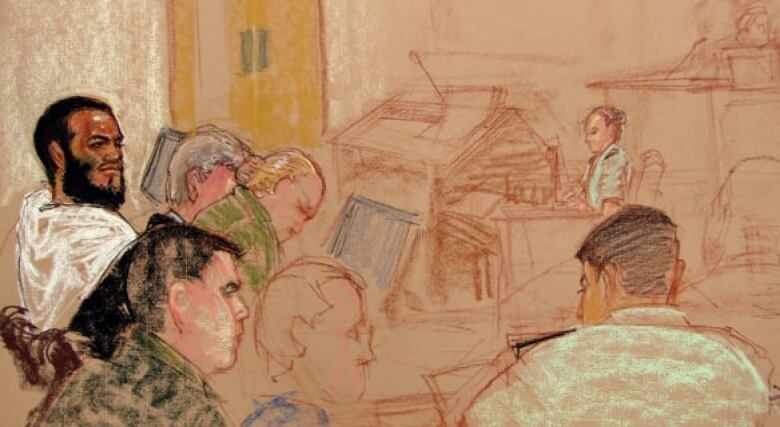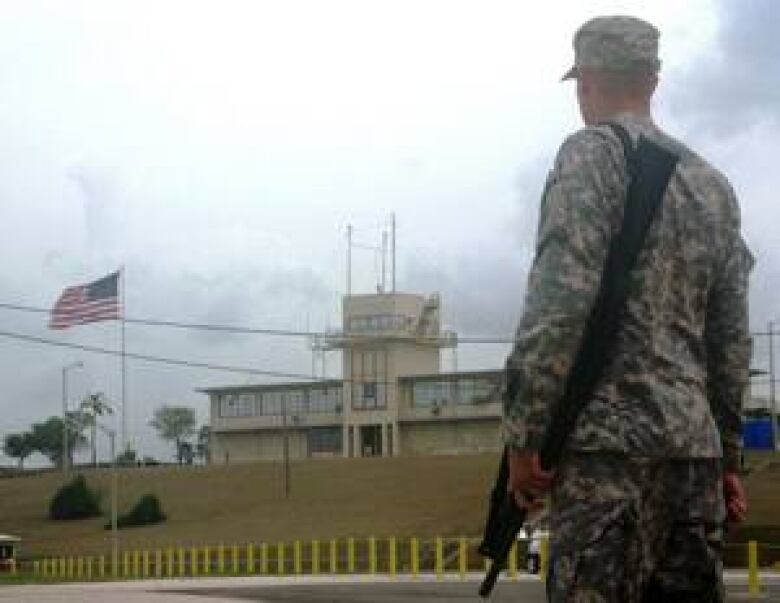Khadr's confession can be used: judge

A judge in Omar Khadr's pretrial hearing in Guantanamo Bay says he will allow into evidence video purportedly showing the Canadian making and planting bombs in Afghanistan, and an apparent confession he made while in custody.
Col. Patrick Parrishrejected defence arguments that Khadr's statements were the product of torture and could not be used against him.
"The motion to suppress the accused's statements is denied," Parrish said Monday, without giving reasons.
Toronto-born Khadr faces five charges, including murder in violation of the laws of war, in the death of a U.S. soldier in Afghanistan in July 2002.
Khadr, 23, formally pleaded not guilty to all five charges Monday after his lawyer said the threat of rape and death by an interrogator should render his client's confessions as coerced and unreliable.
The plea on all charges through his lawyer, Lt.-Col. Jon Jackson, came as pretrial motions wrapped up. In pressing to have the confessions ruled inadmissible, Jackson noted the interrogator testified abouttelling Khadr how a young detainee in American custody had been raped by other inmates, possibly to death.
Detainee abuse
The incident involving the interrogator, former U.S. army sergeant Joshua Claus, occurred at Bagram prison in Afghanistan soon after American forces captured the badly wounded Khadr eight years ago.
"He was 15 years old when Interrogator 1 [Claus] told him that story," Jackson said. "Once he said those words the well is poisoned. The government can't cleanse the well."
Claus was later convicted of detainee abuse.
Khadr was taken to Bagram prison before being transferred in October 2002 to the military prison at Guantanamo Bay, Cuba, where he has been held since.
"By the time he left Bagram, he was broken because of the actions of people in uniform," Jackson said.
For its part, the prosecution branded as lies Khadr's assertions of abuse and torture, noting he refused to take the stand to be cross-examined on his claims.
Khadr's confessions were freely given, reliable, and go to the heart of the case against him, Capt. Chris Eason told Parrish.
"He talked about the grenade. He talked about how he threw the grenade," Eason said. "It's truth that we can rely on."
Proof that Khadr was "prepared and trained" is shown by the fact that Claus's threats induced "no actionable intelligence," Eason said.
The prosecutor said Khadr's FBI interrogators never resorted to threats, inducements or even yelling.

"The people here went to great lengths to act professionally," he said. "There was an atmosphere of rapport."
Khadr later recanted his statements only because other detainees were picking on him for co-operating with authorities, Eason said.
But Jackson asked Parrish to ponder the fallout if an American soldier were captured and threatened with rape, then convicted on the basis of a confession elicited soon after the threats were made.
"There would be an outcry like we've never heard about one of our soldiers being treated that way," Jackson said. "Tell the world that we actually stand for what we say we stand for."
The military commission jurors who will decide Khadr's fate are expected to be seated Tuesday.
Trialstarts Wednesday
The trial itself, expected to start Wednesday, is the first under U.S. President Barack Obama, who pledged on taking office in January 2009 to shut down the military commissions and close the Guantanamo Bayprison.
During the proceedings, Khadr sat beside his Canadian lawyer, Dennis Edney, reading a World Cup soccer magazine.
He was dressed in white, the uniform of the most compliant prisoners, and appeared relaxed and smiling at times. In other pretrial motions, Parrish ruled that security arrangements were fine despite a defence request for less obtrusive measures.
Parrish did rule out parts of a video that show the worst scenes of carnage from the 9/11 terrorist attacks on the United States.
He said those scenes would "not be helpful" to the jury.












_(720p).jpg)


 OFFICIAL HD MUSIC VIDEO.jpg)
.jpg)



























































































